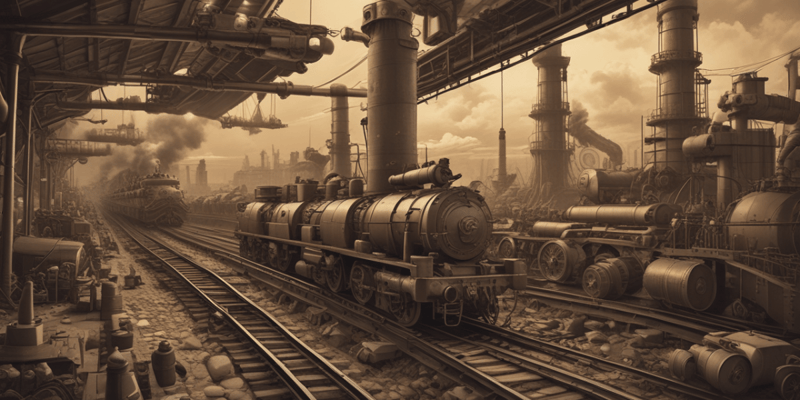16 Questions
¿Cuál evento marcó un cambio profundo en la forma en que se producían los bienes?
La Revolución Industrial
¿Qué tecnologías contribuyeron a la revolución en los procesos de fabricación durante la Revolución Industrial?
Máquina de vapor, spinning jenny, telar mecánico
¿Qué consecuencia tuvo la Revolución Industrial en términos de migración?
Aumento de la urbanización debido a la migración de áreas rurales a las ciudades en búsqueda de empleo en fábricas
¿Cuál fue uno de los efectos clave de la Revolución Industrial en términos de productividad?
Aumento de la productividad debido a la adopción de nuevas tecnologías
¿En qué siglo comenzó la Revolución Industrial?
Siglo XVIII
¿Qué concepto se relaciona estrechamente con el fenómeno de la globalización mencionado en el texto?
Imperialismo
¿Qué consecuencias económicas tuvo la Gran Depresión en la década de 1930?
Desempleo generalizado, quiebras bancarias y declive dramático en el comercio internacional.
¿Qué impacto tuvo la Revolución Industrial en términos de desigualdad de riqueza?
Aumento de la brecha de riqueza entre las naciones industrializadas y el resto del mundo.
¿Qué elementos abarca el concepto de desarrollo económico?
Crecimiento del ingreso per cápita y mejoras en salud, educación e infraestructura.
¿Cuáles fueron las características de la era del colonialismo y el imperialismo?
Establecimiento de colonias, explotación de recursos naturales y imposición de sistemas económicos coloniales.
¿Qué fenómeno se ha convertido en una característica definitoria de la economía mundial en décadas recientes?
Globalización con un creciente nivel de interconexión económica.
¿Cuál fue una consecuencia social de la Gran Depresión?
Tensiones sociales, movimientos políticos disruptivos y surgimiento de regímenes autoritarios.
¿Qué aspectos influyen en el desarrollo económico según el texto?
Innovación tecnológica, inversión en capital humano, acceso a recursos y políticas económicas sólidas.
¿Cuál fue uno de los impactos económicos de la era del colonialismo y el imperialismo?
Extracción de recursos valiosos, interrupción de las economías locales y establecimiento de patrones comerciales que favorecían a las potencias coloniales.
¿Qué cambios socioeconómicos trajo consigo la Revolución Industrial?
Aumento del capitalismo, formación de movimientos laborales y ampliación de la brecha de riqueza entre naciones industrializadas y el resto del mundo.
¿Cuál es una característica fundamental del desarrollo económico según el texto?
Inversión en capital humano, mejora en calidad de vida e innovación tecnológica.
Study Notes
A Brief History of World Economic History
The study of economic history provides valuable insights into the development and evolution of economies across the world. From pivotal events like the Industrial Revolution and the Great Depression to broader concepts such as economic development, colonialism and imperialism, and globalization, the economic history of the world offers a rich tapestry of interconnected events and trends that have shaped the global economy. Let's delve into these key topics to gain a deeper understanding of the historical forces that have shaped our modern economic landscape.
Industrial Revolution
The Industrial Revolution, which began in the late 18th century in Britain before spreading to other parts of the world, marked a profound shift in the way goods were produced. This period saw the transition from agrarian, handcrafted economies to industrialized, machine-driven economies. The invention and widespread adoption of new technologies such as the steam engine, spinning jenny, and power loom revolutionized manufacturing processes, leading to increased productivity and the mass production of goods. As a result, urbanization surged as people migrated from rural areas to cities in search of employment in factories. The Industrial Revolution also brought about significant social and economic changes, including the rise of capitalism, the formation of labor movements, and the widening wealth gap between the industrialized nations and the rest of the world.
Great Depression
The Great Depression, which occurred in the 1930s, was one of the most severe economic downturns in modern history. Triggered by the stock market crash of 1929, the Great Depression had far-reaching consequences, including widespread unemployment, bank failures, and a dramatic decline in international trade. The economic hardships experienced during this period had a profound impact on societies around the world, leading to political upheaval and the rise of authoritarian regimes in some countries. The Great Depression also prompted governments to reevaluate their economic policies, ultimately laying the groundwork for the development of modern macroeconomic theories and the implementation of social safety nets to protect citizens from future economic crises.
Economic Development
The concept of economic development encompasses the sustained increase in the standard of living and economic well-being of a population. It involves not only the growth of per capita income but also improvements in health, education, infrastructure, and overall quality of life. Economic development is influenced by a myriad of factors, including technological innovation, investment in human capital, access to resources, political stability, and sound economic policies. Over the centuries, different regions of the world have experienced varying trajectories of economic development, with some nations achieving rapid industrialization and economic growth, while others have struggled to overcome persistent poverty and underdevelopment.
Colonialism and Imperialism
The era of colonialism and imperialism was characterized by the expansion of European powers into regions across Africa, Asia, and the Americas. This period was marked by the establishment of colonies, the exploitation of natural resources, and the imposition of colonial economic systems that served the interests of the colonizing nations. The economic impact of colonialism and imperialism was profound, as it led to the extraction of valuable resources, the disruption of local economies, and the imposition of trade patterns that favored the colonial powers. While colonialism contributed to economic development in some regions, it also perpetuated inequality and hindered the autonomous growth of many societies.
Globalization
In recent decades, globalization has emerged as a defining feature of the world economy. This phenomenon is characterized by the increasing interconnectedness of economies, societies, and cultures through the flow of goods, services, capital, and information across borders. Globalization has been facilitated by advancements in technology, transportation, and communication, leading to the integration of markets and the expansion of multinational corporations. While globalization has brought about benefits such as increased trade, technological innovation, and access to a wider range of products, it has also been associated with challenges such as income inequality, job displacement, and environmental degradation. The ongoing debate surrounding the impact of globalization continues to shape economic policies and international relations.
Conclusion
The study of world economic history provides valuable insights into the complex forces that have shaped the global economy. From the transformative effects of the Industrial Revolution to the enduring legacy of colonialism and the contemporary dynamics of globalization, the economic history of the world is a multifaceted narrative of progress, upheaval, and interconnectedness. By understanding these key historical events and concepts, we gain a deeper appreciation of the complexities of the modern economy and the challenges and opportunities that lie ahead.
Explore pivotal events and concepts in the economic history of the world, from the Industrial Revolution and the Great Depression to economic development, colonialism and imperialism, and globalization. Gain insights into the historical forces that have shaped the global economy and its modern landscape.
Make Your Own Quizzes and Flashcards
Convert your notes into interactive study material.




